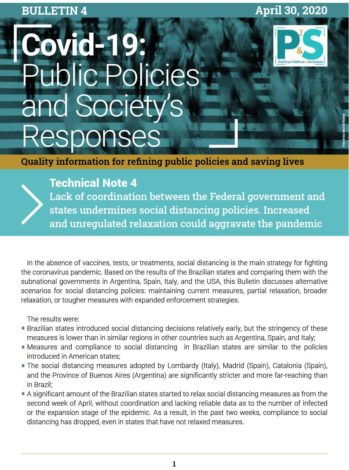In the absence of vaccines, tests, or treatments, social distancing is the main strategy for fighting the coronavirus pandemic. Based on the results of the Brazilian states and comparing them with the subnational governments in Argentina, Spain, Italy, and the USA, this Bulletin discusses alternative scenarios for social distancing policies: maintaining current measures, partial relaxation, broader relaxation, or tougher measures with expanded enforcement strategies.
The results were:
- Brazilian states introduced social distancing decisions relatively early, but the stringency of these measures is lower than in similar regions in other countries such as Argentina, Spain, and Italy;
- Measures and compliance to social distancing in Brazilian states are similar to the policies introduced in American states;
- The social distancing measures adopted by Lombardy (Italy), Madrid (Spain), Catalonia (Spain), and the Province of Buenos Aires (Argentina) are significantly stricter and more far-reaching than in Brazil;
- A significant amount of the Brazilian states started to relax social distancing measures as from the second week of April, without coordination and lacking reliable data as to the number of infected or the expansion stage of the epidemic. As a result, in the past two weeks, compliance to social distancing has dropped, even in states that have not relaxed measures. Technical Note 4 Lack of coordination between the Federal government and states undermines social distancing policies. Increased and unregulated relaxation could aggravate the pandemic Foto: Brian Merrill/Pixabay Covid-19: Public Policies and Society’s Responses BULLETIN 4 April 30, 2020 Quality information for refining public policies and saving lives 2 Solidary Research Network – Bulletin 4 April 30, 2020;
- The paradox is that this drop in social distancing compliance occurs during an expansion of the coronavirus and an increase in the number of deaths. The consequences of a disorderly liberation point towards the aggravation of the health crisis and greater difficulties for economic recovery.
- The results presented in this Bulletin are quite conclusive regarding the predictions of impact on compliance to social distancing across different scenarios. The projections on epidemiological and economic impacts are based on renowned international studies.
Work group responsible
Coordination: Lorena Barberia
Researchers
- Natalia de Paula Moreira (USP)
- Maria Letícia Claro de F. Oliveira (USP e CEPESP/FGV)
- Luiz Guilherme Roth Cantarelli (USP)
- Fabiana da Silva Pereira (USP)
- Isabel Seelaender (USP e CEPESP/FGV)
- Marcela Mello Zamudio (USP e CEPESP/FGV)
- Pedro Schmalz (USP e CEPESP/FGV).


